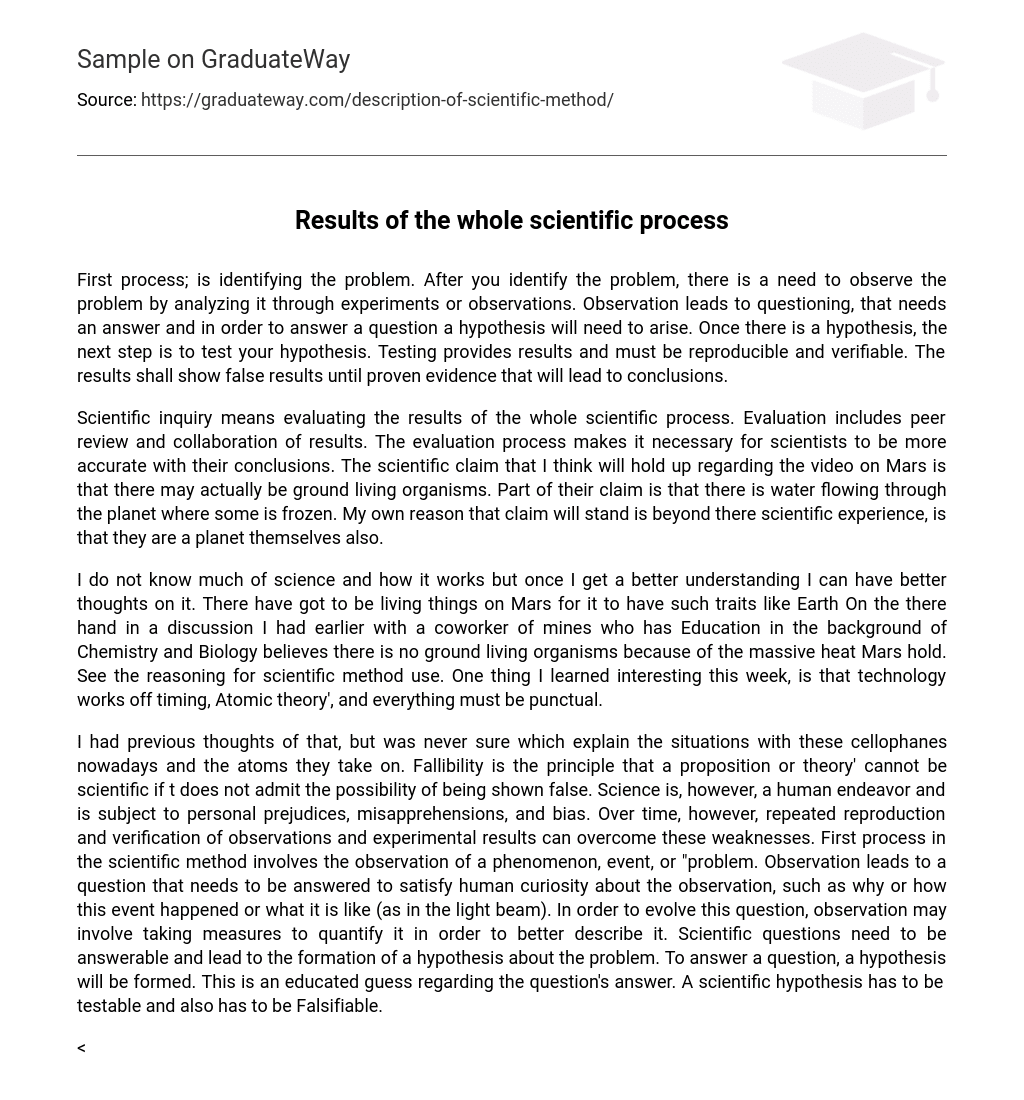First process; is identifying the problem. After you identify the problem, there is a need to observe the problem by analyzing it through experiments or observations. Observation leads to questioning, that needs an answer and in order to answer a question a hypothesis will need to arise. Once there is a hypothesis, the next step is to test your hypothesis. Testing provides results and must be reproducible and verifiable. The results shall show false results until proven evidence that will lead to conclusions.
Scientific inquiry means evaluating the results of the whole scientific process. Evaluation includes peer review and collaboration of results. The evaluation process makes it necessary for scientists to be more accurate with their conclusions. The scientific claim that I think will hold up regarding the video on Mars is that there may actually be ground living organisms. Part of their claim is that there is water flowing through the planet where some is frozen. My own reason that claim will stand is beyond there scientific experience, is that they are a planet themselves also.
I do not know much of science and how it works but once I get a better understanding I can have better thoughts on it. There have got to be living things on Mars for it to have such traits like Earth On the there hand in a discussion I had earlier with a coworker of mines who has Education in the background of Chemistry and Biology believes there is no ground living organisms because of the massive heat Mars hold. See the reasoning for scientific method use. One thing I learned interesting this week, is that technology works off timing, Atomic theory’, and everything must be punctual.
I had previous thoughts of that, but was never sure which explain the situations with these cellophanes nowadays and the atoms they take on. Fallibility is the principle that a proposition or theory’ cannot be scientific if t does not admit the possibility of being shown false. Science is, however, a human endeavor and is subject to personal prejudices, misapprehensions, and bias. Over time, however, repeated reproduction and verification of observations and experimental results can overcome these weaknesses. First process in the scientific method involves the observation of a phenomenon, event, or “problem. Observation leads to a question that needs to be answered to satisfy human curiosity about the observation, such as why or how this event happened or what it is like (as in the light beam). In order to evolve this question, observation may involve taking measures to quantify it in order to better describe it. Scientific questions need to be answerable and lead to the formation of a hypothesis about the problem. To answer a question, a hypothesis will be formed. This is an educated guess regarding the question’s answer. A scientific hypothesis has to be testable and also has to be Falsifiable.
In other words, there must be a way to try to make the hypothesis fail. Published results can also serve as a hypothesis predicting the reproducibility of those results. Testing and experimentation can occur in the laboratory, in he field, on the blackboard, or the computer. Results of testing must be reproducible and verifiable. The data should be available to determine if the interpretations are unbiased and free from prejudice. All evidence and conclusions must be analyzed to make sure bias or inadequate effort did not lead to incorrect conclusions.
It is part of scientific inquiry to evaluate the results of scientific investigations, experiments, observations, theoretical models, and the explanations proposed by other scientists. Evaluation includes reviewing the experimental procedures, examining the evidence, identifying faulty reasoning, pointing out statements that go beyond the evidence, and suggesting alternative explanations for the same observations. It is part Of scientific inquiry to evaluate the results Of scientific investigations, experiments, observations, theoretical models, and the explanations proposed by other scientists.
Evaluation includes reviewing the experimental procedures, examining the evidence, identifying faulty reasoning, pointing out statements that go beyond the evidence, and suggesting alternative explanations for the same observations, journals, and in truth, many scientific paper submitted to peer-reviewed journals are rejected. The evaluation process in science truly makes it necessary for scientists to be accurate, innovative, and comprehensive. Science provides us with a way to present ideas that can be tested, repeated, and verified.
Theories resulting from Scientific and Observation & Measurement done by yourself or one group needs to be validated by further study. Reproducing of the scientific method to test the theory again and again gains confidence that the theory is correct, but still may have flaws because the test conditions may be too narrow validate the theory. Therefore testing by others by elaboration with others can help to add more viewpoints on the theory and others who collaborate may run scientific method at other locations and With other conditions to further confirm and/or refine the theory’.
Peer review allows for others within the scientific community to consider the theory and find flaws or suggest other testing or refinements that are necessary. Peer review may also lead to collaboration with scientist who can run additional testing and may have access to more resources for testing (better equipment, more manpower, research funding, etc. Formulating a problem- knowing what you want to investigate, like choosing certain field to work in 2.
Observation and experiment- this is done with great care, facts Of nature are like building blocks of science and its results. Making sure things are as accurate and objective data that sets science apart from other modes, 3. Interpreting the data- to account for what has been found on how nature works. A scientific interpretation is usually called hypotheses, 4. Testing the interpretation- this is a part of making new observations to see whether the interpretation is going to correctly predict the results.





